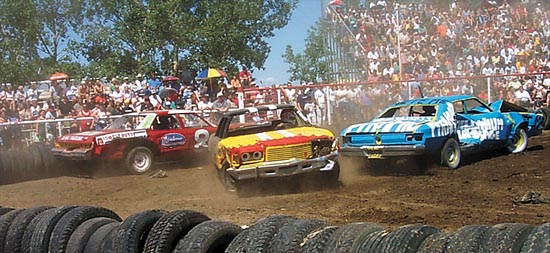"Comin' Through!"

Fans Over Two Days
The Provost Kinsmen Club’s first car crunch held at the fairgrounds over the
Kinsmen spokesman Ken Berry told The News that they were very happy with the demolition derby event and “can hardly wait until next year” when they plan to have more cars and different classes including half tons and small compact cars.
There were 22 cars entered with the object being to ram other cars until they could not operate. The last car operating in each heat was declared the winner and advanced to finals.
Full Story in July 11 Edition of The Provost News
Want to Subscribe to The Provost News? Click here.
Contrary to what many people think, the majority of Alberta’s traffic deaths don’t happen on busy city streets; they happen on highways or country roads. According to Alberta Transportation statistics, seven out of 10 motor vehicle fatalities happen in rural areas.
“We’re finding there are three main reasons people die in rural crashes,” says Staff Sgt. Steve MacDonald, the RCMP’s traffic coordinator. “They drink and drive, ignore stop signs and don’t use their seatbelts.
In 1999, RCMP and traffic safety partners—including hundreds of volunteers—studied the characteristics of drivers in rural areas. They discovered several disturbing trends; four out of 10 rural drivers do not stop at stop signs and only seven in 10 rural drivers wear their seatbelts.
“We see the same scenario over and over in rural Alberta—the driver was drunk, or someone ran a stop sign. Often it’s both. And in far too many rural crashes, none of the occupants was wearing a seatbelt. What might have been a survivable crash ends up a fatality.” MacDonald says.
“There’s this misconception that it’s safer to drive in the country, when in fact, rural road travel is fraught with risks,” says Don Szarko of Alberta Motor Association, a partner in the Mission Possible Traffic Safety Initiative. “Rural areas tend to have gravel roads with higher speed limits, poor visibility, wildlife darting onto the road, or fatigued travelers driving long distances on unfamiliar roads. And if you do crash out on a rural road, you’re a long way from medical help.”
• Always wear your seatbelt and ensure your passengers wear theirs.
• Approach all intersections with caution. Just because you have the right of way doesn’t mean the other driver will stop.
• Always stop at stop signs—even if you can see there are no vehicles coming. Fatal crashes can happen because someone didn’t stop, certain “the coast was clear”.
• Be alert for unanticipated movements like a car drifting across the center line or cutting into your lane. Be prepared to drive calmly into the ditch if necessary to avoid a crash.
Want to Subscribe to The Provost News? Click here.
|
|
|
|
|
|
© All material on this website is copyright by The Provost News, Holmes Publishing Co. Ltd., and Internet Alberta Inc.
All rights reserved. Reproduction or other use is prohibited without permission of The Provost News, Holmes Publishing Co. Ltd., or Internet Alberta Inc. |
|